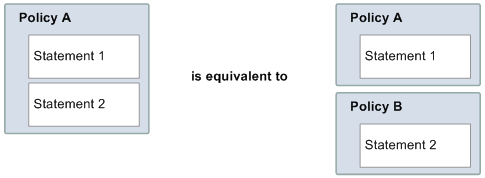Amazon SQS Access Policy Language key concepts
To write your own policies, you must be familiar with JSON
- Allow
- Action
-
The activity that the Principal has permission to perform, typically a request to AWS.
- Default-deny
-
The result of a Statement that has no Allow or Explicit-deny settings.
- Condition
-
Any restriction or detail about a Permission. Typical conditions are related to date and time and IP addresses.
- Effect
-
The result that you want the Statement of a Policy to return at evaluation time. You specify the
denyorallowvalue when you write the policy statement. There can be three possible results at policy evaluation time: Default-deny, Allow, and Explicit-deny. - Explicit-deny
- Evaluation
-
The process that Amazon SQS uses to determine whether an incoming request should be denied or allowed based on a Policy.
- Issuer
-
The user who writes a Policy to grant permissions to a resource. The issuer, by definition is always the resource owner. AWS doesn't permit Amazon SQS users to create policies for resources they don't own.
- Key
-
The specific characteristic that is the basis for access restriction.
- Permission
-
The concept of allowing or disallowing access to a resource using a Condition and a Key.
- Policy
-
The document that acts as a container for one or more statements.

Amazon SQS uses the policy to determine whether to grant access to a user for a resource.
- Principal
-
The user who receives Permission in the Policy.
- Resource
-
The object that the Principal requests access to.
- Statement
-
The formal description of a single permission, written in the access policy language as part of a broader Policy document.
- Requester
-
The user who sends a request for access to a Resource.